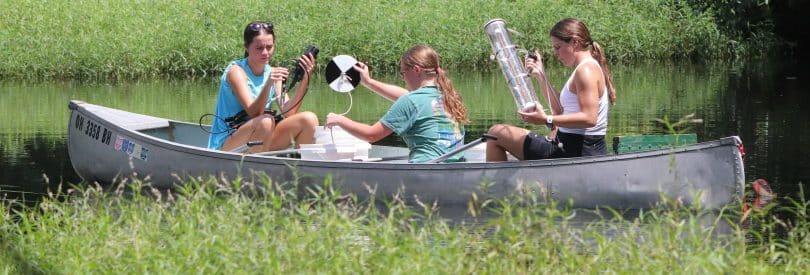
| Department: | |
| Hours Required: | |
| Categories: | |
| Delivery: |

University Requirement (2 hours)
GSTD 1002 – Freshman Seminar
General Education (24 hours)
Note: 11 hours of mathematics, natural science, and physical science requirements are included in the major.
Biology (39 hours)
BIOL 1051 – Issues in Conservation Biology
BIOL 1203 – Principles of Biology I and BIOL 1201 – Principles of Biology I Lab
BIOL 1213 – Principles of Biology II and BIOL 1211 – Principles of Biology II Lab
BIOL 3023 – Microbiology and BIOL 3021 – Microbiology Lab
BIOL 3033 – Genetics and BIOL 3031 – Genetics Lab
BIOL 3183 – Botany and BIOL 3181 – Botany Lab
BIOL 3443 – Global Environmental Change
BIOL 3583 – Biostatistics
BIOL 3763 – Evolutionary Biology
BIOL 4013 – Ecology and BIOL 4011 – Ecology Lab
BIOL 4101 – Biology Colloquium
Select 4 hours from the following:
BIOL 3083 – Plant Physiology and BIOL 3081 – Plant Physiology Lab
BIOL 3703 – Vertebrate Physiology and BIOL 3701 – Vertebrate Physiology Lab
Marine Biology (18 hours)
BIOL 3143 – Comparative Vertebrate Anatomy and BIOL 3141 – Comparative Vertebrate Anatomy Lab
BIOL 3393 – Ichthyology and BIOL 3391 – Ichthyology Lab
BIOL 3503 – Marine Biology
BIOL 3843 – Oceanography
4 hours of upper-level Marine Biology courses taken at an affiliate institution*
Chemistry (12 hours)
CHEM 1023 – University Chemistry I and CHEM 1021 – University Chemistry I Lab
CHEM 1123 – University Chemistry II and CHEM 1121 – University Chemistry II Lab
CHEM 3003 – Organic Chemistry I and CHEM 3001 – Organic Chemistry I Lab
Mathematics (5-6 hours)
Select one of the following options:
MATH 1023 – College Algebra and MATH 1033 – Plane Trigonometry
MATH 1045 – Pre-Calculus Mathematics
MATH 1525 – Calculus I
Physics (4 hours)
Select one of the following course combinations:
PHYS 2003 – College Physics I and PHYS 2001 – College Physics I Lab
or
PHYS 2203 – University Physics I and PHYS 2201 – University Physics I Lab
Electives (15-16 hours)
6-7 hours of unrestricted electives
Total Hours – 120
Note:
*SAU has an affiliate agreement with the University of Southern Mississippi’s Gulf Coast Research Laboratory (GCRL) and will also accept courses taken at Dauphin Island Sea Lab (DISL). Descriptions and prerequisites for GCRL classes are listed online at usm.edu/gcrl and disl.org. Students incur the cost of tuition differences between SAU and affiliate institutions, but may apply to transfer financial aid to offset the costs. Up to 10 credit hours of marine-related courses taken at the affiliate institution may count towards the degree.
| Department: | |
| Hours Required: | |
| Categories: | |
| Delivery: |

University Requirement (2 hours)
GSTD 1002 – Freshman Seminar
General Education (24 hours)
Note: 11 hours of mathematics, natural science, and physical science requirements are included in the major.
Biology (39 hours)
BIOL 1051 – Issues in Conservation Biology
BIOL 1203 – Principles of Biology I and BIOL 1201 – Principles of Biology I Lab
BIOL 1213 – Principles of Biology II and BIOL 1211 – Principles of Biology II Lab
BIOL 3023 – Microbiology and BIOL 3021 – Microbiology Lab
BIOL 3033 – Genetics and BIOL 3031 – Genetics Lab
BIOL 3183 – Botany and BIOL 3181 – Botany Lab
BIOL 3443 – Global Environmental Change
BIOL 3583 – Biostatistics
BIOL 3763 – Evolutionary Biology
BIOL 4013 – Ecology and BIOL 4011 – Ecology Lab
BIOL 4101 – Biology Colloquium
Select 4 hours from the following:
BIOL 3083 – Plant Physiology and BIOL 3081 – Plant Physiology Lab
BIOL 3703 – Vertebrate Physiology and BIOL 3701 – Vertebrate Physiology Lab
Marine Biology (18 hours)
BIOL 3143 – Comparative Vertebrate Anatomy and BIOL 3141 – Comparative Vertebrate Anatomy Lab
BIOL 3393 – Ichthyology and BIOL 3391 – Ichthyology Lab
BIOL 3503 – Marine Biology
BIOL 3843 – Oceanography
4 hours of upper-level Marine Biology courses taken at an affiliate institution*
Chemistry (12 hours)
CHEM 1023 – University Chemistry I and CHEM 1021 – University Chemistry I Lab
CHEM 1123 – University Chemistry II and CHEM 1121 – University Chemistry II Lab
CHEM 3003 – Organic Chemistry I and CHEM 3001 – Organic Chemistry I Lab
Mathematics (5-6 hours)
Select one of the following options:
MATH 1023 – College Algebra and MATH 1033 – Plane Trigonometry
MATH 1045 – Pre-Calculus Mathematics
MATH 1525 – Calculus I
Physics (4 hours)
Select one of the following course combinations:
PHYS 2003 – College Physics I and PHYS 2001 – College Physics I Lab
or
PHYS 2203 – University Physics I and PHYS 2201 – University Physics I Lab
Electives (15-16 hours)
6-7 hours of unrestricted electives
Total Hours – 120
Note:
*SAU has an affiliate agreement with the University of Southern Mississippi’s Gulf Coast Research Laboratory (GCRL) and will also accept courses taken at Dauphin Island Sea Lab (DISL). Descriptions and prerequisites for GCRL classes are listed online at usm.edu/gcrl and disl.org. Students incur the cost of tuition differences between SAU and affiliate institutions, but may apply to transfer financial aid to offset the costs. Up to 10 credit hours of marine-related courses taken at the affiliate institution may count towards the degree.
| Department: | |
| Hours Required: | 120 |
| Categories: | Major, Undergraduate |
| Delivery: | On-Campus |
The Marine Biology option prepares students for careers in marine science, including those in academia, state or federal management agencies, and private industry. Most students will take required marine science classes at The University of Southern Mississippi Gulf Coast Research Laboratory (GCRL) located in Ocean Springs, MS.
The Department of Biology provides students a core foundation in the biological sciences, yet flexibility to craft a unique and individualized educational experience. The department boasts low student-to-instructor ratios that foster interactions between instructors and students, opportunities to conduct research with faculty, and a modern and well-equipped Science building.
Learning Goals
- Our graduates effectively communicate scientific knowledge.
- Our graduates have the knowledge to make informed and ethical scientific decisions.
- Our graduates think critically and creatively to analyze and solve scientific problems.
- Our graduates demonstrate the information literacy required for scientific study.
- Our graduates possess the knowledge and skill sets in biology to be successful.




